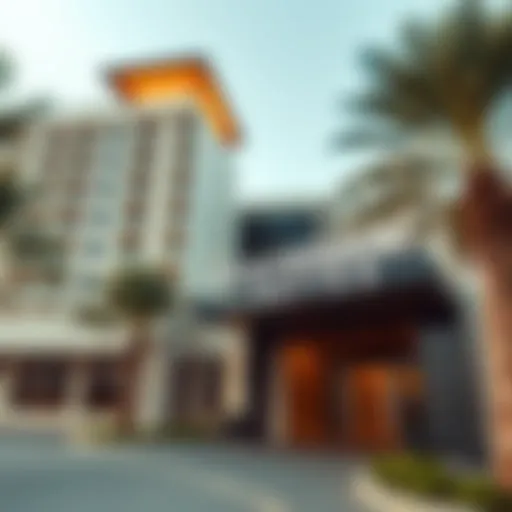University of Abu Dhabi Dubai Branch: An In-Depth Analysis


Intro
The University of Abu Dhabi, particularly its Dubai branch, stands at a unique crossroads of education and real estate, reflecting the vibrant pulse of one of the world’s most dynamic cities. This overview aims to unpack the layers of educational offerings and the campus culture that define the university, all while keeping an eye on Dubai's broader context. As the city evolves, so do its educational institutions, underpinning the ever-shifting landscape of property and investment opportunities. This article digs into what makes the university a pivotal player in not only shaping students' academic journeys but also influencing the fabric of Dubai's community.
In the sections that follow, readers will find insights into market trends influencing education and real estate symbiotically. We'll explore the current property prices and delve into future expectations, equipping potential investors with knowledge to navigate this landscape. Similarly, the discussion around investment strategies will provide practical tips and financing options, all designed to guide investors in harnessing the opportunities that arise from educational developments. The approach here shall remain direct, illuminating and enriched with detail, catering particularly to stakeholders vested in the interplay between education and residential dynamics.
Preamble to the University of Abu Dhabi Dubai Branch
Understanding the University of Abu Dhabi's Dubai branch is pivotal for anyone considering higher education in the region. This institution not only equips students with necessary skills but also integrates itself into the fabric of Dubai’s educational landscape. As a cornerstone of academic achievement, the Dubai branch has become significant among local and expatriate communities alike.
Brief History and Establishment
The University of Abu Dhabi opened its doors in the early 2000s, with the Dubai branch launching subsequently to cater to the demand for quality higher education in one of the fastest-growing cities in the world. Initially, its journey began with a strong focus on business programs, reflecting, at the time, the burgeoning economic landscape of the UAE. Over the years, the university adapted to emerging trends, expanding its offerings to include various disciplines, such as engineering, health sciences, and arts.
The establishment of the Dubai branch was rooted in the vision to create a hub for both local and international students, fostering a curriculum that balances academic rigor and practical experience. Its strategic location in the heart of Dubai makes it accessible to a diverse range of students, from local Emiratis to expatriates who seek to gain a valuable educational experience within a multicultural environment. This has, in turn, contributed to its growing reputation.
Mission and Vision
The mission of the University of Abu Dhabi Dubai branch is clear: to empower students to excel in their personal and professional lives. It emphasizes a holistic educational approach that combines theoretical understanding with practical applications. The institution aims to create not just competent graduates but innovators and leaders.
The vision is aligned with Dubai's broader goals of becoming a global educational hub. By fostering collaboration with industry leaders and adapting to the changing dynamics of education, the university plays a critical role in enhancing the knowledge economy of the region. This mission gives insight into how the university strives not only to educate but to shape the future potential of its students for the betterment of both the UAE and the wider world.
"The commitment to excellence in education helps cultivate a generation prepared to tackle the global challenges of tomorrow."
In summary, the University of Abu Dhabi's Dubai branch is foundational to the educational ecosystem of the emirate, offering distinct opportunities for learning and growth, while staying attuned to the needs of students and the demands of the ever-evolving job market.
Academic Programs Offered
Academic programs are the backbone of any educational institution. They shape not just the students but extend their influence into industries, economies, and communities. The programs offered at the University of Abu Dhabi's Dubai branch reflect a keen understanding of market demands and educational needs. This section delves into the diverse offerings that cater to both undergraduate and postgraduate students, providing insights on their significance in this bustling emirate.
Undergraduate Offerings
Business Administration
The Business Administration program stands as a pillar of the university's academic structure. This field equips students with vital skills in management, finance, and marketing. It's designed for those looking to make their mark in the business world. What makes this program particularly attractive is its hands-on approach. Students engage in real-world case studies, group projects, and internships which prepare them for the dynamic nature of today's jobs.
Moreover, the curriculum is updated regularly to meet industry standards, ensuring that graduates have relevant knowledge and skills. One standout feature is the strong emphasis on entrepreneurship, fostering a mindset of innovation and problem-solving from day one. However, it can be quite demanding, requiring a balance between theory and practical application.
Engineering and Technology
The Engineering and Technology programs are tailored for those who thrive on challenges and innovation. This area combines theoretical foundations with practical skills necessary in today’s technology-driven society. As the demand for engineers continues to rise, this program offers vast opportunities across sectors, from construction to IT.
A key characteristic is its focus on sustainable engineering practices, which aligns perfectly with Dubai’s vision of sustainability and innovation. Students get access to state-of-the-art laboratories and technology. However, the coursework can be rigorous, demanding a high degree of commitment and dedication.
Health Sciences
Health Sciences have taken center stage in educational discourse due to an increasing global focus on public health. The program here is robust, providing students with the knowledge to tackle health challenges facing communities. Courses cover a range of topics from public health to healthcare administration.
This program is notably interdisciplinary, giving students a rounded perspective of health care systems. A unique feature is the emphasis on community engagement, where students take part in fieldwork and outreach programs. Nonetheless, with the escalating cost of healthcare, students must be prepared for the economic implications of a career in health sciences.
Arts and Humanities
The Arts and Humanities program champions critical thinking, creativity, and cultural awareness. It allows students to explore various subjects, from literature to philosophy. This diverse approach instills a broader worldview, making it an appealing choice for those who value social impact and communication skills.
One of the program's highlights is the availability of interdisciplinary courses that allow exploration across subjects. Students are encouraged to engage in discussions, fostering an environment ripe for debate and collaboration. However, securing lucrative employment can sometimes be challenging as the market can be selective, placing a premium on additional skills or experiences.
Postgraduate Options
For those looking to deepen their expertise, the Postgraduate Options cater to professionals aiming to advance their careers or shift their paths. Here are a few notable programs:


Master of Business Administration
The Master of Business Administration is a solid choice for professionals looking to ascend the corporate ladder. This program’s strategic framework prepares students for leadership roles by focusing on critical analysis and decision-making. One primary characteristic of this program is its network-building opportunities, connecting students with industry leaders and alumni.
Alongside theoretical coursework, practical workshops allow students to apply knowledge in real-world scenarios. The downside might be the intensified pressure to perform, as students juggle demanding schedules.
Master of Education
The Master of Education program answers the growing demand for qualified educational leaders. This course is designed for those who want to make significant contributions to educational systems. It delves into modern teaching methodologies, curriculum development, and educational leadership.
What's striking about this program is the emphasis on both theory and practice, offering students opportunities to lead projects in local schools. Prospective students should bear in mind, though, that navigating educational reforms can be complex and requires adaptability.
Specialized Graduate Certificates
The Specialized Graduate Certificates provide flexibility and niche expertise in a shorter timeframe. They are excellent for professionals seeking to enhance specific skills without committing to a full degree. These programs cover a range of topics, from digital marketing to project management.
The speed of completion and the targeted nature make these certificates attractive for busy professionals. However, they may not carry the same weight in some industries as a full degree would.
Admission Requirements
Understanding the admission requirements of the University of Abu Dhabi's Dubai branch is paramount, not just for prospective students but also for investors and others interested in the educational landscape of the region. These specifications are a vital indicator of the institution's commitment to maintaining high academic standards while catering to a diverse body of learners.
The admission criteria serve several critical functions. Firstly, they help establish a benchmark of qualifications that align with the university's mission to foster a culture of excellence. Secondly, they ensure that the student body reflects a mix of backgrounds, which enriches the campus experience for all. Lastly, clear admission requirements facilitate a more straightforward enrollment process, benefitting both students and administrative bodies.
Undergraduate Program Admission Criteria
At the undergraduate level, the University of Abu Dhabi mandates a set of admission criteria that reflects its commitment to attracting academically talented individuals. Firstly, prospective students must hold a high school diploma or its equivalent, offering proof of foundational knowledge. This educational background ensures that students are well-prepared for the rigors of higher education.
In addition to academic qualifications, applicants need to demonstrate adequate proficiency in English. This requirement is essential, particularly since the medium of instruction is English; thus, non-native speakers typically provide results from standardized tests like the IELTS or TOEFL.
Furthermore, admissions may also take into account extracurricular activities and personal statements, which provide insight into the applicant's character and interests.
Postgraduate Program Admission Criteria
Moving to the postgraduate realm, the admission procedures are naturally more selective and rigorous. Candidates looking to apply for master's programs, such as the Master of Business Administration, must usually possess a bachelor's degree from an accredited institution. A minimum GPA might be stipulated, reflecting the university’s standards for advanced study.
Moreover, relevant professional experience is often a key factor. For instance, MBA applicants may be required to submit a CV highlighting their career achievements and leadership roles, thereby exemplifying not only academic prowess but also practical exposure to real-world challenges. Letter of recommendations and a well-crafted statement of purpose further reinforce an applicant’s potential to contribute meaningfully to both the university community and their future fields.
In summary, the admission requirements at the University of Abu Dhabi's Dubai branch embody a clear strategy to cultivate a dynamic and academically robust learning environment, paving the way for both students' successes and the institution’s growth within Dubai's educational framework.
Campus Life and Facilities
The campus life at the University of Abu Dhabi's Dubai branch is not merely about academic learning; it encompasses a rich tapestry of resources and experiences that significantly enrich students' educational journeys. Facilities on campus play a pivotal role in shaping the social, academic, and recreational aspects of university life.
Library and Study Spaces
The library stands as a beacon of knowledge and a haven for students. It is not only stocked with a vast range of academic texts but also equipped with the latest digital resources. This enables students to access various journals, e-books, and databases, allowing them to delve deeper into their fields of study.
A significant feature is the study spaces. These areas are designed to cater to different learning preferences. For instance, collaborative zones foster group discussions, while quiet desks provide solitude for focused study. Moreover, the availability of private study rooms encourages individual research and group project work without disturbances. Students often remark that finding a conducive study environment can drastically influence their productivity.
"A well-equipped library is the heart of an academic institution, where curiosity meets opportunity."
Academic Support Services
A strong academic support system is crucial for student success. The University of Abu Dhabi provides a range of services aimed at ensuring students have the necessary tools for academic achievement.
These services include tutoring programs, writing centers, and academic advising. The accessibility of faculty and teaching assistants promotes a nurturing educational environment. Students can seek guidance on course selection, essay writing, or research methodologies. Additionally, workshops focused on necessary skills, like time management and study techniques, are offered regularly. This holistic approach helps students not only in mastering their subjects but also in developing lifelong learning habits.
Recreational Facilities
When it comes to maintaining a healthy balance between study and relaxation, the recreational facilities at the university serve as a perfect outlet. These facilities include fitness centers, sports courts, and leisure areas, promoting physical well-being alongside academic endeavors.


Participation in sports nurtures teamwork and discipline among students. Whether it's playing basketball or engaging in fitness classes, these activities are essential in building camaraderie among peers. Furthermore, dedicated spaces for relaxation, such as lounges and green areas, allow students to unwind and recharge after rigorous study sessions.
In summary, the collective range of campus life and facilities at the University of Abu Dhabi’s Dubai branch contributes significantly to fostering a vibrant academic environment. The emphasis on comprehensive support and well-maintained recreational spaces enhances both student satisfaction and academic performance.
Student Demographics
Understanding the demographics of students at the University of Abu Dhabi's Dubai branch is pivotal for several reasons. First, it provides insight into the university's cultural makeup, enabling stakeholders, including investors and real estate developers, to grasp the potential for future growth in the surrounding areas. A diverse student body can drive demand for housing, recreational facilities, and community services, which ultimately enhances the local economy.
Local versus International Students
At the Dubai branch, the blend of local and international students is striking. Approximately 60% of the student population comes from various expat backgrounds, while about 40% are Emirati. This mix offers a unique opportunity for cross-cultural engagement.
- Benefits of Local Students: Local students often bring deep-rooted cultural knowledge and are familiar with the region’s history and practices. This can enhance classroom discussions, offering valuable perspectives on local business and governance.
- Influence of International Students: On the flip side, international students contribute a plethora of viewpoints—ranging from Western educational methods to cutting-edge practices from Asia and beyond. This diversity enriches the academic environment and fosters innovation.
In summary, the interaction between these groups makes for a dynamic learning atmosphere. Furthermore, this demographic balance is appealing to investors looking at the housing market, as properties near the campus are likely to be in demand from both locals and expats seeking education for their families.
Diversity and Inclusion Initiatives
Recognizing the broad spectrum of backgrounds at the university, officials have been proactive in their diversity and inclusion initiatives. These programs aim to create a welcoming environment for all students, regardless of their nationality or background.
- Mentorship Programs: There are structured mentorship initiatives that connect local students with international peers, fostering relationship-building and mutual understanding. This not only aids in academic success but also prepares students for a global workforce.
- Cultural Events: Regular cultural exchange events are organized, where students share traditions from their countries. This opportunity encourages students to explore and appreciate different cultures, establishing a sense of community within the campus.
"Diversity is our strength, and inclusion is our goal." - University Statement
Additionally, the university has set up support services tailored for diverse student needs, such as language assistance and counseling. This ensures everyone feels included and valued, ultimately enhancing academic achievement.
Impact on the Local Community
The role of educational institutions, particularly in a vibrant city like Dubai, goes beyond mere academic pursuits. The University of Abu Dhabi's Dubai branch serves as a pivotal player in the local community, fostering collaboration and addressing the needs of diverse populations. By building strong partnerships with local industries and investing in community engagement, the university not only enhances its own stature but also contributes significantly to the social and economic fabric of Dubai.
Partnerships with Local Industries
Collaboration is the name of the game when it comes to strengthening community ties, and the University of Abu Dhabi Dubai branch has embraced this notion wholeheartedly. Forming partnerships with local businesses and industries is a strategic move, offering tangible benefits for both parties.
- Skills Matching: By working closely with businesses, the university can better align its academic offerings to the skills that employers need. This ensures that graduates are not only knowledgeable but also job-ready, bridging the gap between academia and the workforce.
- Internship and Job Opportunities: Such partnerships often lead to internship programs and job placements, providing invaluable work experience to students. This is a win-win, as companies gain fresh talent while students gain real-world experiences.
- Research and Innovation: Collaborative research projects can fuel innovation, addressing local challenges in areas like technology, healthcare, and urban development. The university can serve as a catalyst for solutions that benefit the wider community.
These partnerships also elevate the university’s profile, showing prospective students and investors that it is deeply entrenched in the community’s economic growth.
Community Engagement and Outreach Programs
When it comes to giving back, the University of Abu Dhabi Dubai branch takes community engagement seriously. Outreach programs are designed not just to assist students in their educational journeys, but also to uplift the local community. Consider the following aspects:
- Workshops and Seminars: The university often hosts educational workshops that cater to various demographic groups. From financial literacy for young adults to vocational training for job seekers, these programs make education accessible beyond the classroom.
- Cultural Events: By organizing cultural events, the university promotes social inclusion and celebrates diversity. This not only enriches students' educational experiences but also fosters a sense of belonging among different communities.
- Volunteering Initiatives: Encouraging both students and faculty to engage in volunteering helps build a culture of empathy and support. Whether participating in local clean-ups, mentoring youth, or collaborating with non-profits, these activities weave the university into the very fabric of the community.
Community engagement is not just an add-on; it's integral to the University's mission of shaping responsible future leaders who understand the broader impact of their education.
By harnessing both partnerships with local industries and engagement initiatives, the University of Abu Dhabi's Dubai branch stands as a beacon of community welfare. Its commitment to the local populace exemplifies how educational institutions can play a transformative role in driving social and economic advancements.
Alignment with Dubai’s Educational Vision
The University of Abu Dhabi Dubai Branch plays a crucial role in fulfilling Dubai's ambition to establish itself as a global educational epicenter. This alignment is particularly significant considering the current drive towards enhancing educational standards and elevating the region's profile on the world stage. As Dubai pursues its vision for educational advancement, institutions like the University of Abu Dhabi contribute uniquely to this strategy, creating pathways for both local and international students.
Integration into Dubai’s Learning Ecosystem
The integration of the University of Abu Dhabi into Dubai's expansive learning ecosystem is pivotal. This ecosystem comprises a variety of institutions that foster innovation, research, and personal growth, effectively creating a thriving environment for students. With renowned faculty and modern facilities, the university aligns itself with the emirate's broader educational objectives.
This can be seen through its partnership with other educational institutions and industries, ensuring a collaborative approach that better equips graduates to meet the needs of an evolving job market. The programs are crafted, keeping in mind local demand and global trends, which enhances workforce readiness. Furthermore, there are tailored initiatives, like internships and projects, that ensure practical exposure for students.
- Focus on Industry-Relevant Education: Courses are designed with input from industry leaders, enabling students to acquire skills that are immediately applicable in the workplace.
- Innovative Learning Methods: The university employs cutting-edge technologies like virtual simulations and interactive learning, encouraging a hands-on approach to education.
In this sense, the university doesn’t just prepare students; it actively nurtures the next generation of thinkers and innovators, solidifying Dubai’s educational framework.


Role in Enhancing the City’s Global Standing
The University of Abu Dhabi also plays a significant role in enhancing Dubai's global standing as a preferred destination for quality education. With its diverse offerings in business, technology, health sciences, and the arts, the institution attracts not just local students, but a multitude of expatriates seeking robust academic opportunities.
This influx of international students contributes to a vibrant multicultural atmosphere, enriching campus life and the surrounding community. Moreover, an excellent educational reputation directly correlates with an attractive real estate market, as families looking to settle prefer locations with prestigious educational institutions.
"Institutions like the University of Abu Dhabi are not just places of learning; they are pillars of the community, influencing both social and economic landscapes."
Ultimately, by prioritizing collaborative educational experiences and nourishing an international student body, the university elevates Dubai's status as a leader in the global educational arena. This synergy not only benefits students, but also serves to enhance the attractiveness of Dubai as a lifelong learning destination for individuals and families alike.
Synergy with the Real Estate Market
The connection between educational institutions and the real estate market often proves to be mutually beneficial. The University of Abu Dhabi's Dubai branch is no exception to this trend. Understanding how this institution contributes to the local housing landscape can provide invaluable insights for investors and stakeholders looking at the region's real estate dynamics. Not only does the university attract students from across the globe, but it also stimulates demand for housing, influencing nearby neighborhoods in various ways.
Influence on Housing Demand
With a student body that includes both local and international learners, the university plays a substantial role in shaping housing demand. Prospective students typically look for accommodations within close proximity to campus, thus leading to increased interest in nearby residential areas. This spike in demand often drives up rental prices and can create a competitive market for both expats and locals.
Consider these factors which illustrate this influence:
- Proximity Preference: Students, particularly those new to the area, prefer rentals that simplify their daily commute. Therefore, neighborhoods adjacent to the campus often see a rise in demand for rental properties.
- Market Dynamics: The influx of students enhances the local rental market, further motivating property owners to upgrade their units, which might not only attract students but enhance the overall neighborhood appeal.
- Investor Opportunities: Developers and investors paying attention to the university's growth can find remarkable opportunities to cater to this growing student demand through purpose-built student accommodations.
"Education drives demand. The presence of a university changes the game for local housing markets, making it crucial for investors to keep an eye on these developments."
Impact on Neighborhood Development
Beyond influencing housing demand, the University of Abu Dhabi catalyzes improvements within its surrounding neighborhoods. The influx of students and faculty can result in several positive transformations:
- Commercial Growth: As the student population increases, so does the need for services. Cafés, bookstores, and other amenities often sprout up in response to the increased foot traffic, benefiting existing merchants as well.
- Infrastructure Improvement: Local authorities often invest in infrastructural enhancements like better roads, transportation links, and public services to accommodate the growing population. This, in turn, elevates the overall desirability of the area.
- Cultural Exchange: With a diverse student demographic, cultural initiatives blossom in these neighborhoods. Festivals, food markets, and art events can emerge as communities adapt to the changing social landscape, further enriching the local environment.
- Sustainability Initiatives: Universities often take the lead on sustainability practices. The presence of such institutions can encourage neighborhoods to adopt greener practices and innovations, improving livability.
The interaction between the university and its surrounding areas is a prime example of how education and real estate can enhance each other's value, driving growth and development in exciting directions.
Future Prospects and Developments
The future of the University of Abu Dhabi's Dubai branch holds substantial significance not just for the institution itself but also for the broader educational landscape in Dubai. As the city positions itself as a global hub for education, understanding the university’s upcoming strategies and initiatives is imperative for potential students, investors, and real estate stakeholders. Embracing futuristic approaches, the university aims to not only enhance its academic offerings but also contribute to the overall development of the region.
Expansion Plans
Plans are underway for the University of Abu Dhabi Dubai branch to expand its footprint. This expansion involves not only increasing the physical infrastructure but also enriching the diversity of academic programs available. The administration is keen on creating more spaces that can accommodate the growing number of students. This not only provides a better learning environment but also aligns with Dubai’s vision of enhancing educational standards.
Building more laboratories, classrooms, and recreational spaces are part of this initiative. Additionally, targeted partnerships with technology firms and educational NGOs signal a move towards providing hands-on experiences for students. These developments can lead to practical training opportunities and internships, making graduates more competitive in the job market.
In the words of the university’s officials, "We are dedicated to setting a benchmark in educational excellence that can attract students from around the world."
Emerging Academic Trends
Amidst the backdrop of rapid educational reform, the Dubai branch is leaning into emerging academic trends. Most notably, there’s a noticeable pivot towards incorporating digital learning tools. This includes not just traditional learning but also hybrid approaches where online education complements on-campus experiences. Programs are adapting to the winds of change by focusing on digital literacy and preparing students for an increasingly tech-driven world.
Furthermore, interdisciplinary studies have started taking center stage. By combining fields like health sciences with technology, the university is gearing itself to meet the needs of a changing job market. Moreover, there is an emphasis on sustainability and entrepreneurship, which aligns well with global trends towards environmentally conscious practices and innovative business solutions.
In summary, as the university delves into these prospects, its focus will remain on aligning its offerings with the evolving educational demands and market needs, making it a prime candidate for potential students and investors.
Ending
The conclusion of this article is pivotal, encapsulating a journey through the various facets of the University of Abu Dhabi's Dubai branch. This review showcases not just the academic programs available, but also highlights the campus’s vibrant life and its broader influence on the local community and real estate landscape.
Summary of Key Points
Reflecting upon the core themes discussed, a few critical points stand out:
- Academic Excellence: The university offers a robust selection of undergraduate and postgraduate programs, ensuring students receive well-rounded education tailored for a global market.
- Community Engagement: Its partnerships with local industries and community initiatives signify a commitment to not just education but also societal betterment. These connections play a crucial role in linking students with real-world experiences.
- Diversity: A melting pot of local and international students fosters an environment of inclusion and cultural exchange, which is increasingly valuable in today’s globalized world.
- Impact on Real Estate: The branch’s presence influences local housing demands, contributing to neighborhood development and attractiveness for future investors.
In essence, the University of Abu Dhabi's Dubai branch is more than a mere academic entity; it stands as a symbol of the interconnectedness between education and community development.
Implications for Future Students and Investors
For prospective students, the university opens doors not only to quality education but also practical pathways into various careers. It navigates the balance between theoretical knowledge and practical skills, which is critical in today’s job market.
Investors, on their part, should take a keen interest in the trends emerging from this institution. The influx of students can influence the local economy, driving demand for housing and services. Observing how the university adapts to changes in education trends and market needs will be essential for investors looking to capitalize on growth areas within Dubai.
In summary, the University of Abu Dhabi's Dubai branch serves as a cornerstone in both education and economic development in the region. It provides a unique perspective not only for students but also for those taking interest in the real estate and development sectors.



